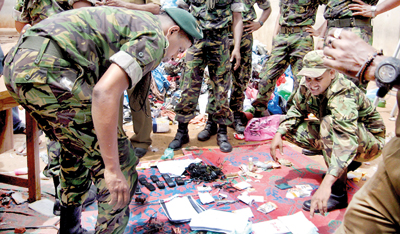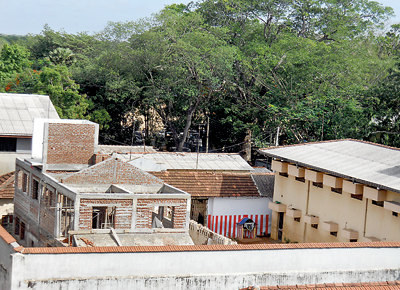News
National malaise of backdoor deals pervades and corrupts the Prisons
View(s):‘Room Service’ of home comforts and conveniences could be arranged with official blessing at a price.
By Namini Wijedasa reports
Prisoners call it “bunker gahanawa” in Sinhala. It means smuggling contraband—mostly phones, phone chargers and drugs—in the rectum.
![]()
Officials say this remains one of the most common methods of smuggling goods into jail. But there are many others. A three-wheeler driver in Wanathamulla described to the Sunday Times last week, how a friend came to his home late one night, clutching a parcel.

From behind the walls:Proliferation of narcotics and phones within Lanka’s jails— a longstanding problem—received fresh attention after the bloody Welikada prison riot of November 11
“I have a hire for you machang,” he had said. They went to Lesley Ranagala Mawatha in Borella. There, at the gate of the official prison quarters, the man handed over his package to a jail guard in civvies.
The man later told the driver, who requested anonymity, that the carefully wrapped bundle had contained two bottles of arrack and a packet of heroin. “He was doing the ‘errand’ on behalf of a supplier who had paid him Rs 2,000 for it,” the driver said.
The proliferation of narcotics and phones within Sri Lanka’s jails—whilst a longstanding problem—received fresh attention this year after a series of police raids culminating in the bloody Welikada prison riot of November 11, when 27 people were killed and more than 40 injured.
The Sunday Times interviewed several ex-remand and convict prisoners, as well as officials from the Prisons Department and Ministry of Prisons Rehabilitation. The names of former inmates have been withheld. It was revealed that drugs and phones are usually available in such large quantities in local jails that nothing short of a complete overhaul would fix the system.
“Raids won’t solve anything,” said one man who had spent six months in remand. “If you take away the phones and drugs, people will find a way of getting them in again.”
This prisoner said, he too, had used a phone. “A guard confiscated it once,” he said. “I was worried because the SIM card had all my numbers including those of my family members and girlfriend. He wouldn’t return the phone to me, but I paid Rs 1,000 for the SIM. My family sent me a new phone through another guard.”

Objects with narcotics hidden within are thrown over the walls of Welikada Priosn to shanty houses in the vicinity
“What happened to the other phone?” he mused. “The guard probably sold it to someone else, either inside prison or outside.”
Not far from the prison quarters is one of the walls of the Welikada prison. Shanty houses are built against its fa�ade. And over it are flung all kinds of objects with narcotics hidden within. This includes tennis balls and, according to Commissioner General of Prisons P.W. Koddipili, limes.
Driving past Welikada prison, one three-wheeler driver pointed out a man in shorts with spiky, salt-and-pepper hair. “That man earns money by finding parking space for vehicles of visitors to the prison,” the driver said. “He too left prison recently. He brags that he once smuggled three phones and chargers into jail, ‘bunker gahala’.”
A released prisoner told the Sunday Times that he knows of inmates smuggling 500ml drink bottles—containing drugs or alcohol—into jail the same way. He said many of the transfers occur when they are taken to court for hearings. Prison guards are allegedly paid to take contraband to inmates in court jailhouses. These end up in anuses.
“I came on a hire to the Maligakanda courthouse,” said the three-wheeler driver from Wanathamulla. “I saw inmates boarding the prison bus. A man suddenly popped a small packet through the grill of the bus window into the hands of a prisoner. The guards just stood there.”
Corrupt guards could be paid in cash or kind. Most transactions happen at their respective homes or quarters, interviews revealed. “I know of prisoners who instruct their wives to allow guards the use of their family car whenever necessary,” said an ex-convict.
A senior prison official at Welikada said peddlers constantly found new ways of moving narcotics into jails. “The latest is that you get the police to book you for a petty crime and come to court with contraband hidden in the anus,” he said. “When you are incarcerated, you transfer the goods and leave prison a week later, by pleading guilty and paying a small fine.”
Prisons officials recently foiled an attempt to transfer narcotics inside a yoghurt container. The tub’s seal had been reattached with super glue, for good measure. Drugs are stuffed into a multitude of foods, even bananas. Visitors are no longer allowed to take powdered tea to inmates after a small batch was found to have been mixed with heroin.
Inmates, meanwhile, are masters of innovation. “Sometimes they hide phones in paint buckets,” an ex-convict described. These plastic receptacles are used to wash clothes or draw water. “They slice one bucket finely in half, place the phone at the bottom and slide the other bucket on top. You could never tell that they are two buckets.”
Facilitating this status quo is a system of parallel administration within prisons. At the apex are several inmates described as “supiri sirakaruwo”. These are usually long-term prisoners including those on death row, as well as high-profile members of the underworld. Money changes hands freely under their auspices.
“There are rooms within the prison, occupied by long-term convicts,” said one of the men interviewed. “If you are jailed for a short period, say 14 days, you can pay a convict a fee to share his space. It’s infinitely more comfortable than the overcrowded cells.”
Some inmates who didn’t have phones, borrowed those owned by the “supiri sirakaruwo”. “You have to get your family to send a reload,” explained the man quoted above. “If they send Rs 500, the phone owner keeps half and you can have Rs 250 worth of talk time.”
Indeed, money talks in more ways than one. An ex-remand prisoner said he had Rs. 600,000 worth of savings when he went to jail. He spent Rs. 200,000 on legal fees. He spent Rs 400,000 for various “services” while in prison.
This included paying prison guards to arrange special visits for his family, and to ensure that they did not stand in line with others; paying drug addicts to wash the toilet before he used it; paying for telephones and reloads; and so on.
“You can get your clothes washed, your back scrubbed, your hair soaped and water poured over you by drug addicts, if you have the money,” he explained. “You can even get an addict to fan you the whole night, with a fan improvised out of two poles and a sarong.”
And this is only a fraction of the story.
Countering the enemy within
Corruption in prisons is a daunting challenge for the government, officials of the Ministry of Prisons Rehabilitation and the Department of Prisons admitted last week.
Errant prison guards were just part of the problem, they said, adding that, the majority of officers were honest. The multitudinous schemes by which inmates continued to acquire drugs and mobile phones, posed a real dilemma.
Commissioner General of Prisons P.W. Kodippili revealed that an average 45% of inmates across Sri Lanka’s jails were drug addicts. (A senior official at Welikada said this figure was 60% at his prison). There was heavy movement of narcotics into prison to meet this demand.
“The Ministry knows what is happening,” said Secretary to the Ministry of Prisons Rehabilitation G.S. Withanage. “That is why we took action to search all the prisons. We found many unauthorised items including drugs and mobiles, complete with serial numbers.”

P.W. Kodippili
“We have information that people inside conduct a lot of underworld activities using phones, and we want these stopped,” he continued. “It is the responsibility of the government, the prisons officers and Prisons Department.”Asked how the Prisons Department responds, Mr. Withanage replied, “They are very cooperative when we convey our concerns to them. They say, yes, we will also help the authorities to stop these things. But the final outcome is not an acceptable level.”
Questioned whether raids were counterproductive, as prisoners continued to secure contraband even afterwards, he said, “We get more and more information from inside about illegal activities. If we don’t take action, the sources of information will dry up.”
“Which are the most corrupt sectors in Sri Lanka?” countered the senior prisons official at Welikada. “It’s education, it is the police. How do drugs come into Sri Lanka? They have scanners at the airport, walk-through machines, sniffer dogs and all kinds of security measures. But inside the country there are hundreds of thousands of kilos of narcotics!”
The police must first stop crime in the country, the official said, without pointing fingers at the Prisons Department. His main complaint was lack of manpower.
Commissioner General of Prisons P.W. Kodippili said they were aware of the shortcomings and were struggling to put them right. There is increased checking within prisons to stop use of mobile phones. A mobile jammer was installed at Welikada, but has not proved effective because signals from nearby towers were too powerful to block.
An ‘Intelligence Unit’ has been established. Last week 99 more were recruited to join the 60 prisons officers already in that unit. These specially trained personnel will be deployed within all prisons to stem corruption and other misbehaviour among employees and inmates alike.
“Transporting contraband in the body was a serious problem,”Mr. Kodippili said. The Department has bought 68 metal detectors to help intercept phones and chargers. Body scanners are also on the shopping list. But hidden narcotics remain a challenge.
Future prisons will have communication facilities for inmates. They could keep in touch with their families, but the calls would be monitored. Mr. Kodippili also referred to longstanding plans to segregate prisoners according to their crimes. He said these measures have been expedited.
Follow @timesonlinelk
comments powered by Disqus




















